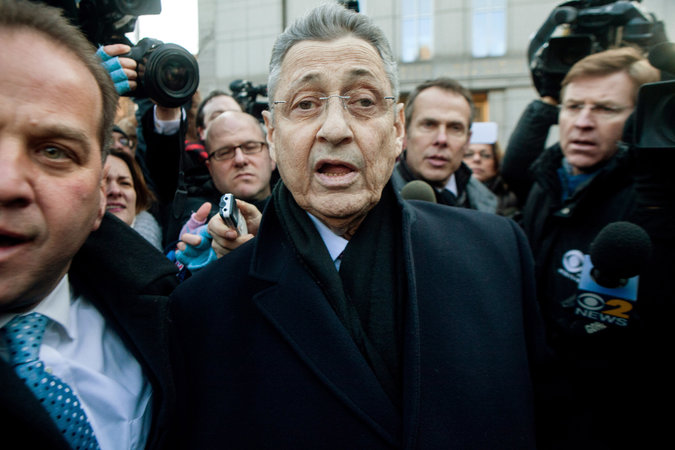Sheldon Silver, the speaker of the New York Assembly, exploited his position as one of the most powerful politicians in the state to obtain millions of dollars in bribes and kickbacks, federal authorities said on Thursday as they announced his arrest on a sweeping series of corruption charges.
For years, Mr. Silver has earned a lucrative income outside government, asserting that he was a simple personal injury lawyer who represented ordinary people. But federal prosecutors said his purported law practice was a fiction, one he created to mask about $4 million in payoffs that he carefully and stealthily engineered for over a decade.
Mr. Silver, a Democrat from the Lower East Side of Manhattan, was accused of steering real estate developers to a law firm that paid him kickbacks. He was also accused of funneling state grants to a doctor who referred asbestos claims to a second law firm that employed Mr. Silver and paid him fees for referring clients.
“For many years, New Yorkers have asked the question: How could Speaker Silver, one of the most powerful men in all of New York, earn millions of dollars in outside income without deeply compromising his ability to honestly serve his constituents?” Preet Bharara, the United States attorney for the Southern District of New York, asked at a news conference with F.B.I. officials. “Today, we provide the answer: He didn’t.”

The arrest of Mr. Silver, 70, immediately upended state government, throwing the capital into convulsions just as this year’s legislative session gets underway. The speaker since 1994, he has long been the most powerful Democrat in the Legislature, and he was expected to play a large role in the coming weeks as lawmakers tussle with Gov. Andrew M. Cuomo over the budget and contentious proposals regarding public schooling and criminal justice.
It also cast new attention on Mr. Cuomo’s decision to shut down the Moreland Commission, an anticorruption panel that he appointed in July 2013 but abruptly ended last March. On Thursday, lawmakers and lobbyists confronted what had previously seemed like an unfathomable prospect: The Legislature’s most immovable and unassailable leader, who has weathered repeated scandals and outlasted Democrats and Republicans alike, had become the latest in an embarrassing march of Albany lawmakers accused of corruption.
“As we are reminded today, those who make the laws don’t have the right to break the laws,” Richard Frankel, the special agent in charge of the Criminal Division of the New York office of the Federal Bureau of Investigation, said at the news conference.
A federal magistrate judge issued seizure warrants to block Mr. Silver from access to $3.8 million that the speaker had spread among eight bank and asset-management accounts.
Mr. Silver appeared in Federal District Court in Lower Manhattan on Thursday afternoon. His lips pursed, he listened as Frank Maas, a federal magistrate judge, told him that he was prohibited from leaving the continental United States.

Graphic: The Case Against Sheldon Silver

Document: Charges Against Sheldon Silver
“Yes, sir,” Mr. Silver said when Judge Maas asked if he understood the conditions of his release — the only words Mr. Silver spoke during the brief hearing. He was released on a $200,000 personal recognizance bond and surrendered his passport.
(It was a stark change from a day earlier, when Mr. Cuomo, during his State of the State address, spoke of taking Mr. Silver and the leader of the State Senate on a series of international trade missions, including one to Mexico. The governor showed a doctored image depicting himself, Mr. Silver and the Senate leader, whom he nicknamed the Three Amigos, on horseback and wearing sombreros.)
Mr. Silver moved gingerly out of the courtroom and bent over to sign a court illustrator’s sketch before saying, in the hallway, that he was innocent. “I’m confident that after a full hearing and a due process, I will be vindicated,” he said softly.
The arrest put the spotlight back on the spate of corruption scandals in Albany and immediately overshadowed the ambitious second-term agenda that Mr. Cuomo laid out in his speech. Several government watchdog groups responded to the arrest by calling for passage of new ethics measures.
Before Mr. Cuomo disbanded the anticorruption panel, it had sought to investigate the outside income of lawmakers; legislative leaders, including Mr. Silver, sued to block the inquiry.

The sudden closing led to a criminal investigation into the circumstances of the shutdown by Mr. Bharara’s office, which took over the commission’s cases and promised to continue its work. The case against Mr. Silver began in June 2013 and was aided by the Moreland Commission’s work.
The five-count criminal complaint runs to 35 pages and lays out the schemes in detail. It charges Mr. Silver with honest services mail and wire fraud, conspiracy to commit honest services mail fraud, extortion “under the color of law” — using his official position to commit extortion — and extortion conspiracy. If convicted, Mr. Silver faces a maximum of 20 years in prison for each count.
Mr. Silver’s profitable legal career — he reported earning more than $650,000 in 2013 — has long been viewed with suspicion in the capital, perhaps for good reason: Mr. Bharara’s office concluded that Mr. Silver received steady checks but performed no legal work for the money.
In one scheme described in court papers, he asked a pair of real estate developers to hire a small law firm, Goldberg & Iryami, which seeks reductions in New York City property taxes on behalf of its clients.
The firm was started by Jay Arthur Goldberg, who decades ago worked as a lawyer for the Assembly, according to state payroll records. Prosecutors said he was Mr. Silver’s counsel.
Mr. Silver received a slice of the legal fees paid to the firm, even though he did no work for the developers; prosecutors said he was paid about $700,000. He did not report the income on his annual financial disclosure forms submitted to the state.
One of the developers was Glenwood Management, according to people familiar with the matter. Glenwood develops luxury apartment buildings in Manhattan, has been an enormous contributor to state politicians and has a significant interest in matters before the Legislature, such as measures dealing with real estate taxation. While receiving fees from the real-estate law firm, Mr. Silver took actions that benefited the developers, prosecutors said.
A lawyer for Glenwood declined to comment, as did a lawyer for Mr. Goldberg.
An even more lucrative scheme, according to prosecutors, involved clients whom Mr. Silver referred to Weitz & Luxenberg, a large personal injury law firm where he has worked for more than a decade.
The referrals came from a doctor who directed possible asbestos victims to Weitz & Luxenberg. Mr. Silver then secretly funneled state grants, worth $500,000 in total, to finance the doctor’s research. The relationship was lucrative for Mr. Silver: He received more than $3 million in fees for the patients referred to Weitz & Luxenberg, prosecutors said.
The doctor, unnamed in the complaint, is Robert N. Taub, director of the Columbia University Mesothelioma Center, a person briefed on the investigation said. Dr. Taub did not respond to a request for comment.
The criminal complaint also suggested what many of Mr. Silver’s critics had long suspected — that he was hired at Weitz & Luxenberg for what was essentially a no-show job. One of the firm’s founding partners told federal authorities that Mr. Silver was originally hired not to perform any legal work, but to boost the firm’s prestige.
A spokeswoman for Weitz & Luxenberg said the firm had cooperated with the government and had been unaware of any wrongdoing.
Mr. Silver’s political future was uncertain on Thursday. The state’s Republican Party called on him to resign his office, and the Assembly minority leader, Brian M. Kolb of Canandaigua, called him to step down as speaker.
Assembly Democrats met privately at the State Capitol. The majority leader, Joseph D. Morelle of Irondequoit, said Democrats were standing behind Mr. Silver. “We have every confidence that the speaker is going to continue to fill his role with distinction,” he said.
Mayor Bill de Blasio of New York City also came to Mr. Silver’s defense, telling reporters, “I’ve always known Shelly Silver to be a man of integrity, and he certainly has due-process rights.”
Mr. Cuomo, in a meeting with the editorial board of The Daily News on Thursday, said Mr. Silver’s arrest was “a bad reflection on government.” But he said it was up to Assembly Democrats as to whether Mr. Silver should remain as speaker.
Mr. Bharara was unsparing in his description of Mr. Silver’s conduct, saying the charges against him “go to the very core of what ails Albany.”
He added, somewhat ominously, that his office was in the midst of pursuing a number of other public corruption investigations.
“You should stay tuned,” he said.
Source: NY Times













































































































































































































































![[Video] Chicago Police Officers Caught On Video Telling Two Black Men "We Kill Mother F**kers"](https://earhustle411.com/wp-content/uploads/2018/07/evil-cop-3-300x180.jpg)
![[Video] Chicago Police Officers Caught On Video Telling Two Black Men "We Kill Mother F**kers"](https://earhustle411.com/wp-content/uploads/2018/07/evil-cop-3-80x80.jpg)












![[Video] White Woman Calls The Cops On Black Real Estate Investor, Cops Threaten To Arrest Her For Harassing Him](https://earhustle411.com/wp-content/uploads/2018/05/nosy-neighbor-300x180.png)
![[Video] White Woman Calls The Cops On Black Real Estate Investor, Cops Threaten To Arrest Her For Harassing Him](https://earhustle411.com/wp-content/uploads/2018/05/nosy-neighbor-80x80.png)


![White Scientist Says The Black Community Is Being Targeted By The Medical System, They Are Deliberatly Being Poisoned [Video]](https://earhustle411.com/wp-content/uploads/2016/05/mike-adams-300x180.jpg)
![White Scientist Says The Black Community Is Being Targeted By The Medical System, They Are Deliberatly Being Poisoned [Video]](https://earhustle411.com/wp-content/uploads/2016/05/mike-adams-80x80.jpg)








![Teenage Girl Shot In Her Stomach Three Times But Took Time To Post To Facebook [ Video]](https://earhustle411.com/wp-content/uploads/2016/02/Gangster-chick-300x180.jpg)
![Teenage Girl Shot In Her Stomach Three Times But Took Time To Post To Facebook [ Video]](https://earhustle411.com/wp-content/uploads/2016/02/Gangster-chick-80x80.jpg)







